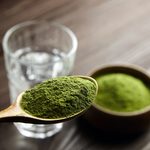Tiny, Powerful Flaxseed
Teeny-tiny, shiny brown flaxseeds are a godsend to your blood sugar as well as your heart, so if you haven’t tried them yet, it’s time for a trip to the store.
Buy ground flaxseed or grind it yourself in a food processor or coffee grinder. If you don’t see it in your supermarket, look in a natural foods store. Using flaxseed may be a mystery to you now, but it’s simple once you know how. It has a pleasant, nutty flavour.
Flaxseed is rich in both protein and fibre (more than 2 grams per tablespoon of ground seeds). It’s also a good source of magnesium, a mineral that’s key to good blood sugar control, because it helps cells use insulin. Several large studies have found that the risk of developing type 2 diabetes skyrockets when magnesium intake is low, so get your fill. Even if you already have diabetes, getting plenty of magnesium can help.
Don’t eat enough fish? Load up on flaxseed. It’s rich in alpha linolenic acid (ALA), which the body uses to make the same type of omega-3 fatty acids you get from fish. Like fish, flaxseed keeps your heart healthy by lowering cholesterol, keeping your heart pumping normally, and preventing dangerous blood clots from forming. Also like fish, it guards against inflammation in the body, which is linked to many age-related disorders, including insulin resistance and diabetes.
Health Bonus
Because flaxseed protects against inflammation, it also helps guard against inflammatory conditions such as rheumatoid arthritis, asthma, Crohn’s disease, eczema, and psoriasis.
The omega-3 fats in flaxseed help prevent and even help treat breast cancer, thanks to hormone-like plant compounds called lignans. In the body, these convert to compounds that are similar to the body’s own estrogen but have much weaker activity. By occupying estrogen receptors on cells, they block the effects of natural estrogen and thus may provide protection against hormone-fueled cancers such as breast cancer. Flaxseed has several hundred times more lignans than any other plant food.
Like fish, flaxseed may also offer protection from Alzheimer’s and depression. Constipated? Flaxseed should do the trick. (Eat too much, and you’ll quickly discover the laxative effects.)
Cooks Tips
The lignans in flaxseed are much better absorbed by the body if the seeds are eaten ground or crushed. (Whole seeds, on the other hand, tend to pass right through your body undigested.) But because of its high fat content, flaxseed will spoil if you grind it but don’t use it right away. The solution: Buy whole seeds in bulk and grind them only as you need them. Whole seeds will last up to a year stored at room temperature. If you buy ground flaxseed, keep it in the fridge.
Menu Magic
You can easily make ground flaxseed part of almost any meal.
- Sprinkle on hot or cold cereal.
- Add to meat loaf, meatballs, burgers, and casseroles.
What About Flaxseed Oil?
Flaxseed oil provides the omega-3 fatty acids that flaxseed does, but not the fibre or lignans. If heart health is your main concern, you may want to consider taking either flaxseed oil or fish oil daily to get more “good fats” into your diet. Because flax thins the blood, talk to your doctor before taking it if you’re on acetylsalicylic acid therapy or taking blood-thinning medication. Dosages range from 1 teaspoon to 1 tablespoon once or twice a day.
The oil goes rancid easily, so keep it refrigerated. You can use it in salad dressings, add it to steamed vegetables after cooking, or sprinkle it over grain dishes, but don’t cook with it, since heat destroys its nutrients.



